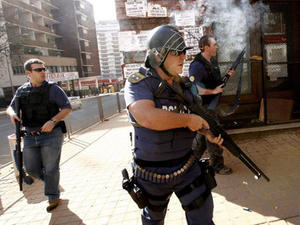World Cup watchOne police officer for every ten foreign soccer fans braving the trip to South Africa
The few soccer fans who go to South African this summer for the soccer World Cup — FIFA issued 2.1 million tickets, but even after selling nearly one million of them to local fans at deep discounts, it still has between 500,000 and 700,000 unsold tickets — will have to brave not only South Africa’s exceedingly high levels of violent crime, but also politically motivated violence, as white extremists are trying to disrupts preparations for the games, which begin 11 June; the tournament will be the most heavily guarded ever: there will be only 400,000 non-South Africans coming to the games, but the South African government has dedicated 44,000 police officers to protect spectators; football teams will be guarded separately by specialized police units with additional security for high risk teams and matches (the government is not disclosing numbers here)

South African riot police // Source: guardian.co.uk
In lawless South Africa, if criminals do not get you, then political violence may well. South African police says it has foiled a plot by right-wing extremists to bomb black townships ahead of the football World Cup.
AFP reports that police arrested five far-wing suspects in swoops across the country in which they seized caches of firearms, including explosives, illegal guns, and ammunition. One group arrested in the capital Pretoria had manufactured arms and planned to plant bombs in townships, weeks ahead of the expected arrival of nearly 400,000 football fans for the tournament, said Police Minister Nathi Mthethwa. “They were planning to go test some of their explosives in any black township,” he told journalists.
Mthethwa said suspects were detained as part of a police sweep of several areas after the end of a gun amnesty last month. “It’s not one group of people who’ve been arrested around this period. It’s quite a number of them,” he said.
Police ministry spokesman Zweli Mnisi said the five suspects were arrested in Pretoria and in Worcester, north-east of Cape Town, and had a “strong linkage to right wing operations.” “Police through our intelligence…swooped on large cache of firearms, including explosives, illegal guns, ammunition,” he told AFP. “At this stage we won’t divulge much as it may compromise investigations. We commend our members for the sterling job,” he added.
Police chief Bheki Cele said pockets of people had been arrested in the Western Cape, Gauteng and Limpopo provinces.
The arrests follow the killing of white supremacist Eugene Terre’Blanche last month which inflamed race tensions amid initial calls for revenge from his far-right movement that were later retracted.
Terre’Blanche’s murder prompted fears of a racial violence ahead of the tournament which starts on 11 June amid lingering divisions sixteen years after the fall of apartheid white minority rule.
Twenty-one right-wingers remain on trial for trying to overthrow the government in 2002 through several attacks, including an explosion on a railway line at Soweto outside Johannesburg that killed a woman.
The Sunday Independent reported last month that police had arrested a man in Western Cape province as part of an investigation into an alleged plot by right-wing extremists to sabotage the World Cup.
The paper said 62-year-old Frederick Rabie was arrested when an arms cache, including explosives and thousands of rounds of ammunition, was found at his home in Worcester.
The paper claimed the investigation into the alleged sabotage plot was linked to the Web site www.boycott-2010-world-cup.co.nr, which urges white people to boycott the World Cup.
South Africa’s police and authorities moved quickly to condemn Terre’Blanche’s death, meeting with his right-wing movement and urging calm among South Africans.
The government has dedicated 44,000 police officers to the World Cup and police chiefs from the thirty-one participating nations and Interpol have given the nod to the tournament’s security plan.
Football teams at the World Cup next month will be guarded by specialized police units with additional security for high risk teams and matches. “We are adequately prepared,” said Mthethwa.
